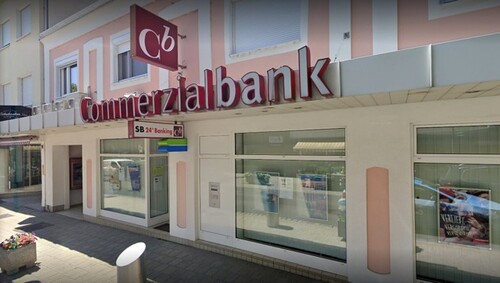This Blog Post is now in the queue for publishing as requested.
Depending on transfer load expect completion in around 15 minutes or 60 minutes if it has just been published by the owner.
This Blog Post has been removed from the queue for publishing as requested.
Balancing the balance sheet in the commercial bank began decades ago
Posted by
Otto Knotzer on August 10, 2020 - 8:22am
The malversations of ex-bank boss Martin Pucher and ex-manager K. may have started before 1995 and thus still in the Raiffeisen era
3. August 2020, 07:00

After 25 years, the counters of the Matttersburger regional bank were closed forever. The institute is bankrupt, the balance sheets are said to have been tweaked before 1995.
Photo: APA / ROBERT JAEGER
Vienna - Burgenland has been turbulent since the Commerzialbank Mattersburg house of cards collapsed. As reported, the Burgenland Economic and Sports Council Christian Illedits (SPÖ) resigned on Saturday - he stumbled over 100 grams of gold. He had a gold bar of this weight given to him around two years ago in his 60s (when Illedits was still the first president of the state parliament) from the SC Mattersburg football club and the Burgenland football academy. He was devastated, said the current ex-politician, giving the gift back and drawing the political consequences with his departure. Under criminal law, there is a prohibited acceptance of benefits. Active repentance exempting punishment does not exist in cases of official offenses.
According to Illedits, his withdrawal had nothing to do with the huge balance sheet scandal of the Commerzialbank, a lot of economic, personal and quasi sporting interdependencies and the resignation demands made by the ÖVP.
Threads all over the place
Just a few of these amalgamations: Illedits is the supervisory board chairman of the football academy (45 percent belong to the state, 35 percent to SV Mattersburg), his vice-president was Martin Pucher until recently. He was also head of the bank and president of SV Mattersburg. This and the Commerzialbank together have recently sponsored the football academy with around 1.5 million euros. Illedits (until 2019 president of Askö in Burgenland) is also president of the football club in his home town, ASV Draßburg. Main sponsor: the Commerzialbank, most recently with 60,000 euros a year. And: As a regional economic councilor, Illedits was also responsible for the economic cooperatives. The majority of the commercial bank is owned by a credit union.
The state outsourced its auditing as early as 1994/95 - to the auditor Gerhard Nidetzky - his law firm later became the TPA. TPA auditing has been auditing the cooperative since 2007, and has also been auditing the Commerzialbank's balance sheets since 2006 (previously, according to Nidetzky & Partner).
TPA only audited a single bank
TPA Wirtschaftsprüfung does not audit other credit institutions, as can be seen from its 2019 transparency report.
1995 plays a very important role in the Commerzialbank case - not just because the bank was founded at that time. Before that, Pucher led the Raiffeisenbank Schattendorf, and as a "Raiffeisen rebel" he removed it from the sector, the Raiffeisenlandesbank Burgenland. Whereby one reads the history at Raiffeisen differently, there one speaks of the exclusion of the Schattendorfer. Another Raiffeisen bank in Burgenland was in trouble at the time and had to be rescued by the sector, but: The Schattendorfer under Pucher did not want to pay and were therefore, depending on the interpretation, excluded or motivated to leave. In 1995 Commerzbank was created, which was renamed Commerzialbank in 1997 after a protest by the German Commerzbank.
Balance sheets wrong for decades
However - and that could have already played a role back then: Pucher was likely to have started balancing the balance sheet back in the Raiffeisen era. At that time he is said to have asked his young bank employee K. for the first falsifications of balance confirmations. This is evident from statements in the case for which Pucher and K. take responsibility. The presumption of innocence applies to both. At Raiffeisen there was nothing to be learned about this.
After two or three years, the fake amounts had become so high that it was clear that Pucher would no longer be able to close the holes as planned. At the end of the 90s, the employee is said to have planned to jump, but Pucher persuaded her to stay - from then on, the forgeries became a round-the-clock job for K.
According to bank records, she did not take vacation, and even juggled at night with made up accounts, loans and deposits. The bankers ran a small counterfeiting workshop, say people who are now clearing up the matter. The end of the story: around 500 fake accounts and a total of 600 million euros made up on the balance sheet. Around 427 million euros alone in invented credit balances of the commercial bank with major banks and more than 150 million euros in "credit claims" against private customers - above all doctors. Why were the loan customers so popular? Their credit rating is generally good, and the commercial bank couldn't go into the land register for loans that didn't exist.
Wrong sponsorship contracts
This created a kind of artificial big bank in the small bank: K. took care of account management, transferring bookings and posting of payment slip deposits, Pucher was responsible for cash withdrawals. Sponsorship funds for SV Mattersburg were also set up in this way, and existing contracts were partially refined



